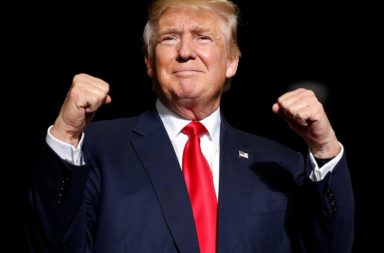Response to Emergency Motion Exhibit A
IN THE UNITED STATES COURT OF APPEALS FOR THE NINTH CIRCUIT No. 17-35105
STATE OF WASHINGTON, et al. Plaintiffs-Appellees, JOINT DECLARATION OF
vs. DONALD J. TRUMP, President of the United States, et al.,
Defendants-Appellants. SUSAN E. RICE
We, Madeleine K. Albright, Avril D. Haines, Michael V. Hayden, John F. Kerry, John E. McLaughlin, Lisa O. Monaco, Michael J. Morell, Janet A. Napolitano, Leon E. Panetta, and Susan E. Rice declare as follows:
1. We are former national security, foreign policy, and intelligence officials in the United States Government:
- Madeleine K. Albright served as Secretary of State from 1997 to 2001. A refugee and naturalized American citizen, she served as U.S. Permanent Representative to the United Nations from 1993 to 1997 and has been a member of the Central Intelligence Agency External Advisory Board since 2009 and the Defense Policy Board since 2011, in which capacities she has received assessments of threats facing the United States.
- Avril D. Haines served as Deputy Director of the Central Intelligence Agency from 2013 to 2015, and as Deputy National Security Advisor from 2015 to January 20, 2017.
- Michael V. Hayden served as Director of the National Security Agency from 1999 to 2005, and Director of the Central Intelligence Agency from 2006 to 2009.
- John F. Kerry served as Secretary of State from 2013 to January 20, 2017.
- John E. McLaughlin served as Deputy Director of the Central Intelligence Agency from 2000-2004 and Acting Director of CIA in 2004. His duties included briefing President-elect Bill Clinton and President George W. Bush.
- Lisa O. Monaco served as Assistant to the President for Homeland Security and Counterterrorism and Deputy National Security Advisor from 2013 to January 20, 2017.
- Michael J. Morell served as Acting Director of the Central Intelligence Agency in 2011 and from 2012 to 2013, Deputy Director from 2010 to 2013, and as a career official of the CIA from 1980. His duties included briefing President George W. Bush on September 11, 2001, and briefing President Barack Obama regarding the May 2011 raid on Osama bin Laden.
- Janet A. Napolitano served as Secretary of Homeland Security from 2009 to 2013.
- Leon E. Panetta served as Director of the Central Intelligence Agency from 2009-11 and as Secretary of Defense from 2011-13.
- Susan E. Rice served as U.S. Permanent Representative to the United Nations from 2009-13 and as National Security Advisor from 2013 to January 20, 2017.
2. We have collectively devoted decades to combatting the various terrorist threats that the United States faces in a dynamic and dangerous world. We have all held the highest security clearances. A number of us have worked at senior levels in administrations of both political parties. Four of us (Haines, Kerry, Monaco and Rice) were current on active intelligence regarding all credible terrorist threat streams directed against the U.S. as recently as one week before the issuance of the Jan. 27, 2017 Executive Order on “Protecting the Nation from Foreign Terrorist Entry into the United States” (“Order”).
3. We all agree that the United States faces real threats from terrorist networks and must take all prudent and effective steps to combat them, including the appropriate vetting of travelers to the United States. We all are nevertheless unaware of any specific threat that would justify the travel ban established by the Executive Order issued on January 27, 2017. We view the Order as one that ultimately undermines the national security of the United States, rather than making us safer. In our professional opinion, this Order cannot be justified on national security or foreign policy grounds. It does not perform its declared task of “protecting the nation from foreign terrorist entry into the United States.” To the contrary, the Order disrupts thousands of lives, including those of refugees and visa holders all previously vetted by standing procedures that the Administration has not shown to be inadequate. It could do long-term damage to our national security and foreign policy interests, endangering U.S. troops in the field and disrupting counterterrorism and national security partnerships. It will aid ISIL’s propaganda effort and serve its recruitment message by feeding into the narrative that the United States is at war with Islam. It will hinder relationships with the very communities that law enforcement professionals need to address the threat. It will have a damaging humanitarian and economic impact on the lives and jobs of American citizens and residents. And apart from all of these concerns, the Order offends our nation’s laws and values.
4. There is no national security purpose for a total bar on entry for aliens from the seven named countries. Since September 11, 2001, not a single terrorist attack in the United States has been perpetrated by aliens from the countries named in the Order. Very few attacks on U.S. soil since September 11, 2001 have been traced to foreign nationals at all. The overwhelming majority of attacks have been committed by U.S. citizens. The Administration
5. In our professional opinion, the Order will harm the interests of the United States in many respects:
- The Order will endanger U.S. troops in the field. Every day, American soldiers work and fight alongside allies in some of the named countries who put their lives on the line to protect Americans. For example, allies who would be barred by the Order work alongside our men and women in Iraq fighting against ISIL. To the extent that the Order bans travel by individuals cooperating against ISIL, we risk placing our military efforts at risk by sending an insulting message to those citizens and all Muslims.
- The Order will disrupt key counterterrorism, foreign policy, and national security partnerships that are critical to our obtaining the necessary information sharing and collaboration in intelligence, law enforcement, military, and diplomatic channels to address the threat posed by terrorist groups such as ISIL. The international criticism of the Order has been intense, and it has alienated U.S. allies. It will strain our relationships with partner countries in Europe and the Middle East, on whom we rely for vital counterterrorism cooperation, undermining years of effort to bring them closer. By alienating these partners, we could lose access to the intelligence and resources necessary to fight the root causes of terror or disrupt attacks launched from abroad, before an attack occurs within our borders.
- The Order will endanger intelligence sources in the field. For current information, our intelligence officers may rely on human sources in some of the countries listed. The Order breaches faith with those very sources, who have risked much or all to keep Americans safe – and whom our officers had promised always to protect with the full might of our government and our people.
- Left in place, the Executive Order will likely feed the recruitment narrative of ISIL and other extremists that portray the United States as at war with Islam. As government officials, we took every step we could to counter violent extremism. Because of the Order’s disparate impact against Muslim travelers and immigrants, it feeds ISIL’s narrative and sends the wrong message to the Muslim community here at home and all over the world: that has identified no information or basis for believing there is now a heightened or particularized future threat from the seven named countries. Nor is there any rational basis for exempting from the ban particular religious minorities (e.g., Christians), suggesting that the real target of the bar remains one religious group (Muslims). In short, the Administration offers no reason why it abruptly shifted to group-based bans when we have a tested individualized vetting system developed and implemented by national security professionals across the government to guard the homeland, which is continually re-evaluated to ensure that it is effective. The Order may even endanger Christian communities, by handing ISIL a recruiting tool and propaganda victory that spreads their message that the United States is engaged in a religious war.
- The Order will disrupt ongoing law enforcement efforts. By alienating Muslim-American communities in the United States, it will harm our efforts to enlist their aid in identifying radicalized individuals who might launch attacks of the kind recently seen in San Bernardino and Orlando.
- The Order will have a devastating humanitarian impact. When the Order issued, those disrupted included women and children who had been victimized by actual terrorists. Tens of thousands of travelers today face deep uncertainty about whether they may travel to or from the United States: for medical treatment, study or scholarly exchange, funerals or other pressing family reasons. While the Order allows for the Secretaries of State and Homeland Security to agree to admit travelers from these countries on a case-by-case basis, in our experience it would be unrealistic for these overburdened agencies to apply such procedures to every one of the thousands of affected individuals with urgent and compelling needs to travel.
- The Order will cause economic damage to American citizens and residents. The Order will affect many foreign travelers, particularly students, who annually inject hundreds of billions into the U.S. economy, supporting well over a million U.S. jobs. Since the Order issued, affected companies have noted its adverse impacts on many strategic economic sectors, including defense, technology, medicine, culture and others.
6. As a national security measure, the Order is unnecessary. National security-based immigration restrictions have consistently been tailored to respond to: (1) specific, credible threats based on individualized information, (2) the best available intelligence and (3) thorough interagency legal and policy review. This Order rests not on such tailored grounds, but rather, on (1) general bans (2) not supported by any new intelligence that the Administration has claimed, or of which we are aware, and (3) not vetted through careful interagency legal and policy review. Since the 9/11 attacks, the United States has developed a rigorous system of security vetting, leveraging the full capabilities of the law enforcement and intelligence communities. This vetting is applied to travelers not once, but multiple times. Refugees receive the most thorough vetting of any traveler to the United States, taking on the average more than a year. Successive administrations have continually worked to improve this vetting through robust information- sharing and data integration to identify potential terrorists without resorting to a blanket ban on all aliens and refugees. Because various threat streams are constantly mutating, as government officials, we sought continually to improve that vetting, as was done in response to particular threats identified by U.S. intelligence in 2011 and 2015. Placing additional restrictions on individuals from certain countries in the visa waiver program –as has been done on occasion in the past – merely allows for more individualized vettings before individuals with particular passports are permitted to travel to the United States.
7. In our professional opinion, the Order was ill-conceived, poorly implemented and ill-explained. The “considered judgment” of the President in the prior cases where courts have deferred was based upon administrative records showing that the President’s decision rested on cleared views from expert agencies with broad experience on the matters presented to him.
Here, there is little evidence that the Order underwent a thorough interagency legal and policy processes designed to address current terrorist threats, which would ordinarily include a review by the career professionals charged with implementing and carrying out the Order, an interagency legal review, and a careful policy analysis by Deputies and Principals (at the cabinet level) before policy recommendations are submitted to the President. We know of no interagency process underway before January 20, 2017 to change current vetting procedures, and the repeated need for the Administration to clarify confusion after the Order issued suggest that that Order received little, if any advance scrutiny by the Departments of State, Justice, Homeland Security or the Intelligence Community. Nor have we seen any evidence that the Order resulted from experienced intelligence and security professionals recommending changes in response to identified threats.
8. The Order is of unprecedented scope. We know of no case where a President has invoked his statutory authority to suspend admission for such a broad class of people. Even after 9/11, the U.S. Government did not invoke the provisions of law cited by the Administration to broadly bar entrants based on nationality, national origin, or religious affiliation. In past cases, suspensions were limited to particular individuals or subclasses of nationals who posed a specific, articulable threat based on their known actions and affiliations. In adopting this Order, the Administration alleges no specific derogatory factual information about any particular recipient of a visa or green card or any vetting step omitted by current procedures.
9. Maintaining the district court’s temporary restraining order while the underlying legal issues are being adjudicated would not jeopardize national security. It would simply preserve the status quo ante, still requiring that individuals be subjected to all the rigorous legal vetting processes that are currently in place. Reinstating the Executive Order would wreak havoc on innocent lives and deeply held American values. Ours is a nation of immigrants, committed to the faith that we are all equal under the law and abhor discrimination, whether based on race, religion, sex, or national origin. As government officials, we sought diligently to protect our country, even while maintaining an immigration system free from intentional discrimination, that applies no religious tests, and that measures individuals by their merits, not stereotypes of their countries or groups. Blanket bans of certain countries or classes of people are beneath the dignity of the nation and Constitution that we each took oaths to protect. Rebranding a proposal first advertised as a “Muslim Ban” as “Protecting the Nation from Foreign Terrorist Entry into the United States” does not disguise the Order’s discriminatory intent, or make it necessary, effective, or faithful to America’s Constitution, laws, or values.
10. For all of the foregoing reasons, in our professional opinion, the January 27 Executive Order does not further – but instead harms – sound U.S. national security and foreign policy.




